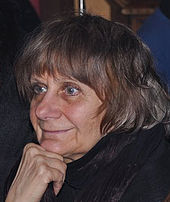The dear lady
The Dear Lady ( Russian Милая дама / Milaja dama ) is a story by Lyudmila Petruschewskaja from 1987, which is about the end of an affair. According to the narrator, this material, which is widespread in literature, can be told with a tragic ending. Instead, there is speculation about what the characters think. Postmodern works undermine the illusionistic element of traditional realistic novels through this type of metafictional commentary.
Milaja dama was first published in 1987 in the magazine Avrora and then included in Petrushevskaya's collection of short stories Bessmertnaja ljubov ' (1988), which was published by the Moskovskij rebocij publishing house in Moscow. The work is in German in a translation by Antje Leetz in the volume Immortal Love. Narratives included. It was first published in 1990 by Volk und Welt in Berlin and then in 1992 by Rowohlt Verlag in Reinbek near Hamburg.
Subject of the story
At the beginning of the story, an older man has just got into a taxi, smiles out of the window and waves to a much younger woman with a child. He met her, "the dear lady", as a neighbor during his stay at the dacha. In the same taxi sits his wife, who turned up unexpectedly and caused the farewell that the other two - so the narrator suspects - hope that it will not be forever. A fourth person, the owner of the dacha, had previously distracted the wife, so that the two could exchange a few trivial friendly words with each other as usual, undisturbed. At the end of the story, the man has just got into the taxi that is taking him back to his busy city life. In his comments, the narrator points out that the course of events in the story was constructed through his telling.
Interpretation of the subject
Nina Kolesnikoff describes the design of this story in her interpretation: Right at the beginning it is said that the story is banal because the course of events is predictable and so is the result. Metafictional commentary is used to assert that the traditionally known subject of a short-lived extramarital affair could have been expanded into a classic novel, with a tragic end. Instead, only one episode is described here: the end of this affair. But even this one episode remains vague.
Kolesnikoff sees the story as an important example of how the plot is structured metafictionally in postmodern narration. This is not primarily about the plot, locations or characters. The story reads more like a guide to writing metafictional comments: The topic of the story is the question of what conditions exist for fictional writing . Less important is the desire to create the illusion with a story that what is being told is likely, but more important is whether one is able to skillfully manipulate literary conventions. The narrator does not understand what happened to the relationship, and he does not understand the feelings of the lover, according to Kolesnikoff's interpretation.
output
- First published in: Avrora (Moscow), 1987, number 2, pp. 87-94
- Recorded in the volume Bessmertnaja ljubov ' , Moskovskij rebocij, Moscow 1988 and cover story of the volume Milaja dama. Monologi i istorii , Vagrius, Moscow 2003, ISBN 5-9560-0043-0
- Contained in German in: Immortal Love. Narratives . Translated from the Russian by Antje Leetz and Renate Landa. Volk und Welt, Berlin 1990, ISBN 978-3-353-00748-3 ; as well as in Rowohlt, Reinbek bei Hamburg 1992, ISBN 3-499-13165-X , therein pp. 54-57
Award for the story book
- Alexander Pushkin Prize for Russian-language literature from the Alfred Toepfer Foundation FVS
Research literature
- Nina Kolesnikoff: Metafictional Plot Structures , Chapter 3 of her study: Russian postmodernist metafiction , table of contents , Lang, Bern [u. a.] 2011, ISBN 978-3-0343-0609-6 , pp. 49-66, pp. 49-50
Individual evidence
- ^ A b Nina Kolesnikoff: “Metafictional Plot Structures”, Chapter 3 in: Russian postmodernist metafiction , table of contents , Lang, Bern [u. a.] 2011, ISBN 978-3-0343-0609-6 , pp. 49-65, pp. 49-50
- ↑ From my blood and brain . In: Der Spiegel . No. 5 , 1992 ( online - SPIEGEL editor Annette Meyhöfer on the Moscow author Lyudmila Petruschewskaja).
